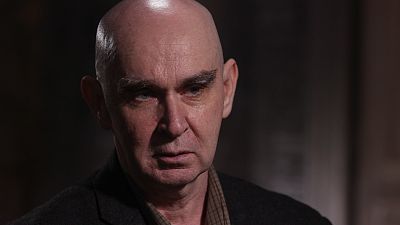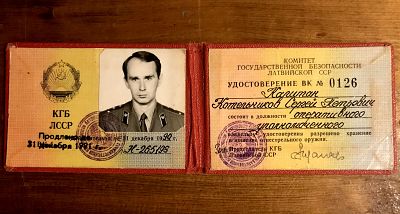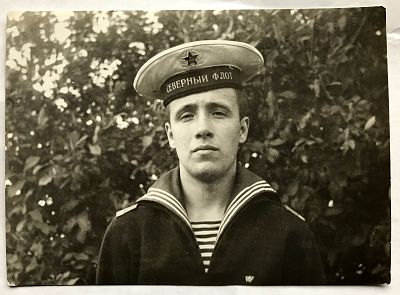"Something is probably going to happen,'" Boris Karpichkov says his old friend told him. "It's very serious, and you are not alone."
LONDON — The former Russian double agent got a terrifying message on his birthday: He was on a Kremlin hit list along with Sergei Skripal, another ex-spy who weeks later was poisoned with a nerve agent in a case Britain blames on Vladimir Putin's government.
"Be careful, look around, something is probably going to happen,'" the former agent, Boris Karpichkov, says an old friend told him on the telephone in mid-February. "It's very serious, and you are not alone."
Among the names on the list was that of Skripal, whom Karpichkov didn't know at the time but whose poisoning alongside his daughter, Yulia, on March 4 on British soil inflamed tensions between the Kremlin and the West and triggered international condemnation. The two are in a hospital in Britain, where Skripal is in critical condition. Yulia is "improving rapidly" and is no longer in critical condition, the hospital treating the pair said Thursday.
Also on the Kremlin's list, he says, were several other ex-KGB agents, as well as Christopher Steele, author of a 35-page dossier alleging collusion between Russia and the Trump campaign. Bill Browder, the driving force behind a set of U.S. sanctions against Russian individuals known as the Magnitsky Act, was there as well, he adds.
FOR MORE, WATCH "NIGHTLY NEWS WITH LESTER HOLT" ON NBC TONIGHT, AND SEE THE FULL REPORT ON "ON ASSIGNMENT WITH RICHARD ENGEL" ON MSNBC FRIDAY AT 9 P.M. ET
Karpichkov, 59, says that at first he thought the call was a joke rather than a threat — typically dark Russian humor. But Skripal's poisoning has put him on high alert. "Trademark FSB," he says, referring to Russia's security agency, the Federal Security Service, the successor to the Soviet-era KGB. NBC News interviewed Karpichkov over the weekend at a rented studio in London; he refused to say where he lives in the U.K.
Putin has denied Russian involvement in the Skripal case, calling the allegations "nonsense."
What began as a spat between London and Moscow has snowballed into a chorus of international criticism of the Kremlin, with a series of governments ejecting dozens of Russian diplomats.
On Monday, the U.S. announced that it was expelling 60 Russians, which followed the U.K.'s decision to kick out 23. Russia's foreign minister said on Thursday that Moscow would expel the same number of diplomats from each nation that has expelled Russian diplomats.
Karpichkov believes that the attack, if not directly approved by Putin, was at least authorized at the highest levels of the FSB. It was a "very planned, organized and performed operation," he said.
The Skripals' poisoning, with the nerve agent Novichok, has sent chills through the large Russian expatriate community in the U.K. Defectors and Kremlin critics are particularly rattled.
Skripal isn't the only former Russian spy to be poisoned in the U.K.: In November 2006,Alexander Litvinenko, an FSB officer-turned-dissident, died in a London hospital after drinking a cup of tea laced with polonium-210, a highly radioactive substance. An inquiry by British investigators concluded that his death was the work of the Russian state and was probably greenlighted by Putin himself.
Karpichkov was one of two former double agents who spoke with NBC News about their anxieties in the wake of the Skripal poisoning.
Victor Makarov, another former KGB agent, fears for his safety but lives in a much less guarded way than Karpichkov.
He invited NBC News to his small apartment in a public housing block in the sleepy northern England town of Haltwhistle. He considers the watchful neighbors and tight-knit community his best defense against any attempt on his life by Russian agents.
"If any stranger appears, he will be immediately seen, believe me," says the 63-year-old. "I have two people on my side: God and the local community."
Makarov now lives a modest life on a state pension equivalent to around $1,124 per month, but once seemed destined for greater things. He overlapped with Putin at an academy for aspiring KGB agents, although he has no memory of the future Russian president, he says.
Upon graduating, Makarov worked as a Greek-to-Russian translator in Soviet intelligence. He grew disenchanted with Soviet foreign policy after the 1979 invasion of Afghanistan and repression in Poland.
"My defection was caused by the fact that I realized I was doing the wrong things, serving this regime," he says.
He approached a British spy in Moscow through an intermediary and, over a two-year period, passed information to U.K. intelligence. Makarov was eventually caught, arrested and sentenced to 10 years in a forced labor camp. His sentence was cut in half after the collapse of the Soviet Union, and he was freed in February 1992.
After his release, Makarov approached a British official in Latvia, who facilitated his defection to the U.K.
Makarov, now a British citizen, believes that Putin, resentful toward the West for "being ignored," simply wants to be reckoned with. He "adores brinkmanship and intimidation," Makarov says.
"Brinkmanship is dangerous by definition."














